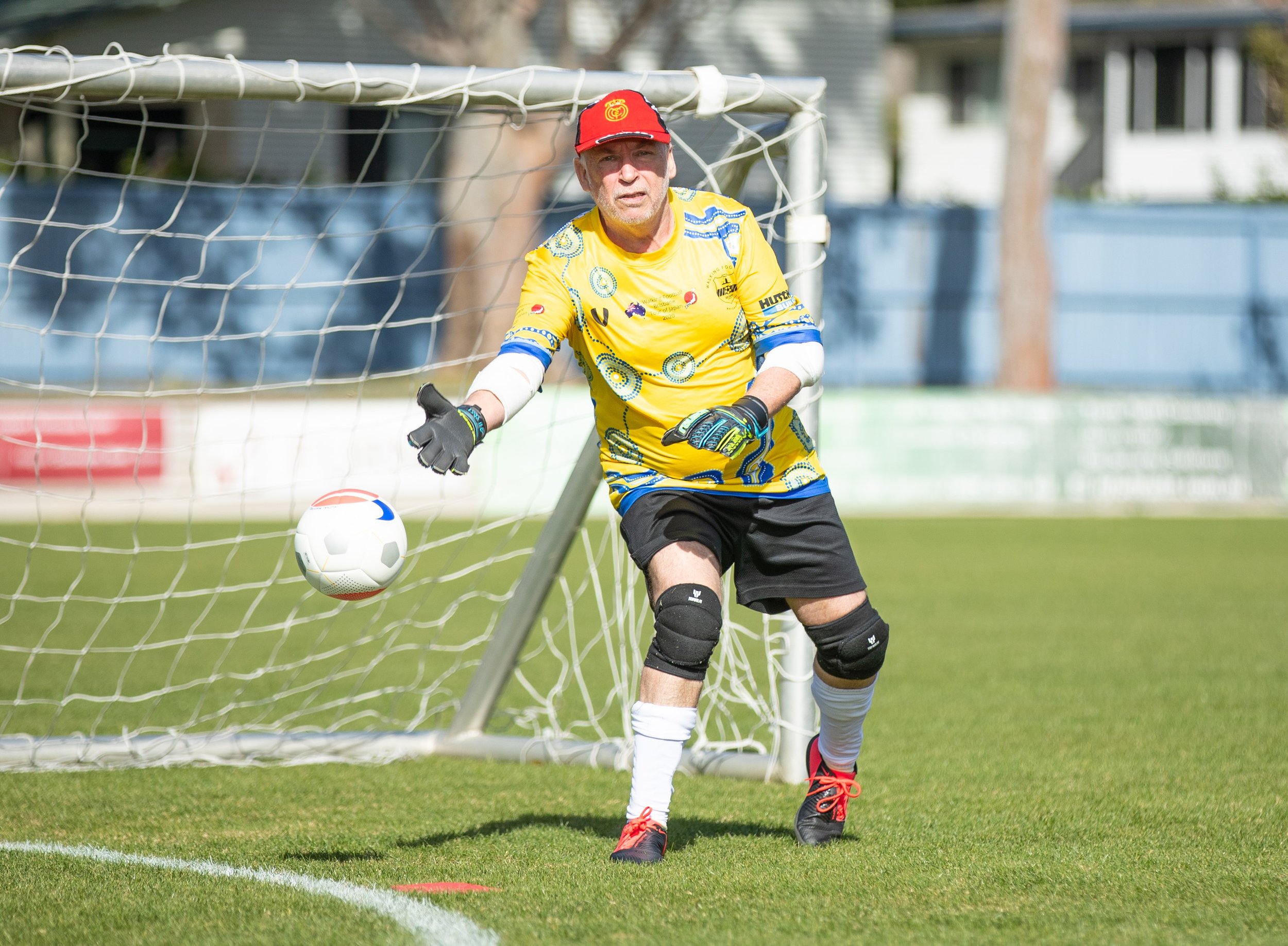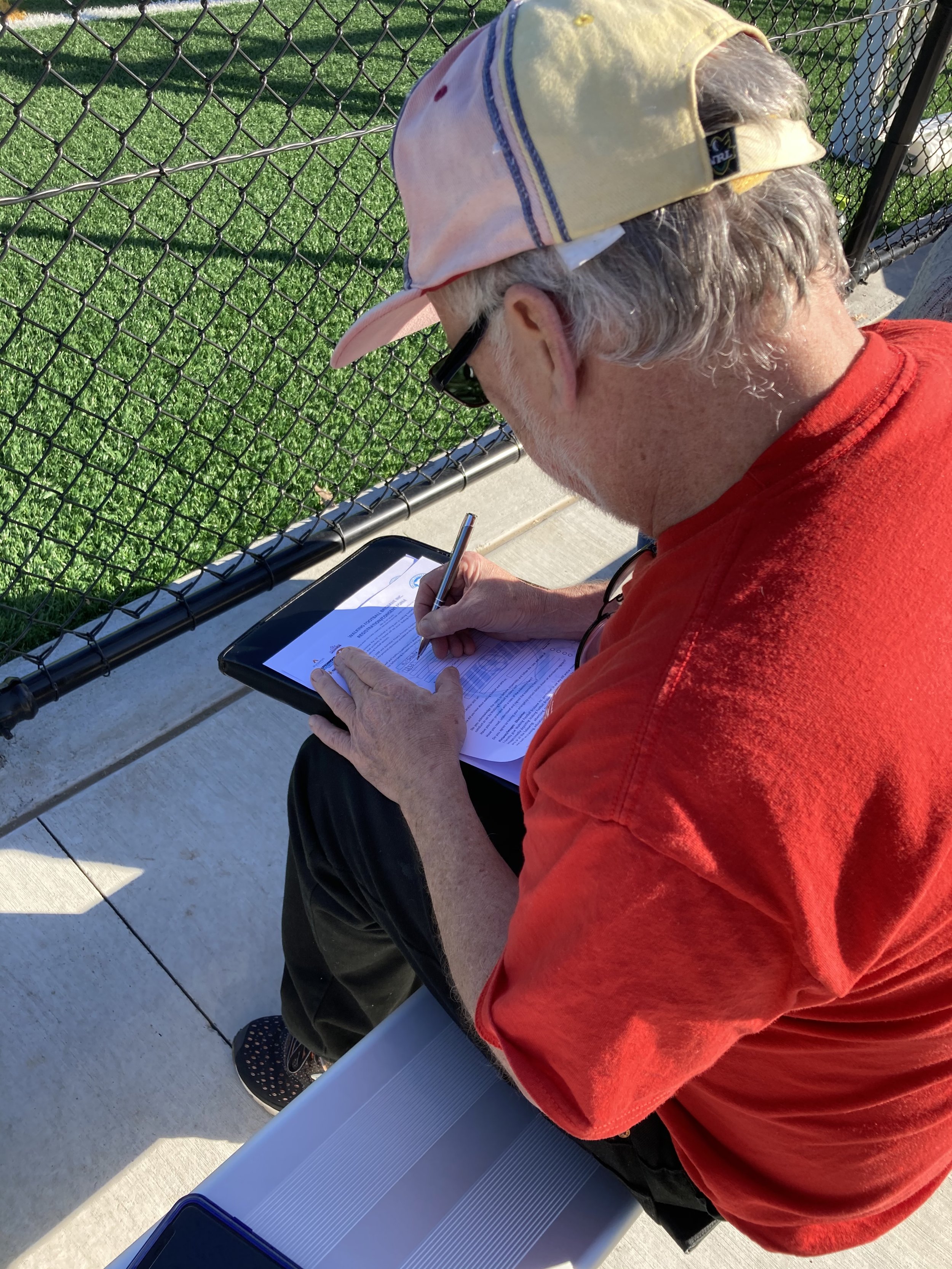Member Profile - Anthony ‘The Wall’ Pollock
IT’S NEVER TOO LATE TO DISCOVER WHAT YOU’RE GOOD AT – I’M GOOD AT BEING A WALL
It was just another ordinary day in an otherwise unremarkable week when the two masked gunmen stormed into the hotel kitchen where I was working as a fifteen-year-old apprentice chef. Dropping everything, I immediately joined the rest of the kitchen staff in a mad dash to the rear exit door only to find ourselves confronted by more armed men waiting for us in the service yard behind the hotel. Then, at gunpoint, we were all forcibly marched around the side of the building to the front of the hotel where the rest of the, now terrified, staff were being held by yet more gunmen. Meanwhile, the men from whom I’d originally fled, were still inside the hotel busily planting an explosive device deep within the bowels of the building. Then, once the bomb was set, the gunmen rapidly left the scene – immediately followed by the rest of us scattering in all directions. Minutes later, a deafening sound pierced the, now, eerie silence as an entire building – its history and its memories – was blown away. Perhaps, dear reader, I should have first mentioned that this ordinary day in an otherwise unremarkable week was, in fact, in Belfast in the early 1970s.
I was born in Northern Ireland in 1956 and spent the early part of my youth living with my family in the neighbourhood of Cregagh in County Down, southeast of Belfast – the birthplace of world-renowned football (soccer) great, George Best. Football in Northern Ireland, like almost everywhere else in the world, is more than just a sport, it’s a way of life. Not surprisingly, then, almost all the boys in my neighbourhood played the game, and they did so all the time and in every conceivable place – in backyards, on streets, and at school. I, too, played football – or, at least, I tried too – but, very early on, discovered I was a rubbish at it.
Unfortunately, the other way of life in Northern Ireland during this time was sectarianism – euphemistically referred to as ‘The Troubles’. Relations between Catholic and Protestant citizens were at best strained, and at worst deadly. The sound of gun shots, the fear of explosions, and the threat of death became a normal way of life. Then, one day, the situation became so dire that my parents were “encouraged” to leave Northern Ireland altogether – the only home they’ve ever known. So in 1973, my family and I reluctantly left Cregagh (which, perhaps, fittingly means ‘the rocky place’) and emigrated to Sydney, Australia, on a ship, coincidentally, called ‘Australis’.
Upon arriving in Sydney, my family and I had a three-month stay, courtesy of the Australian Government, at the Endeavour Immigration Hostel in South Coogee before moving into a rental house in Tempe. This was followed by another move to Rockdale and then finally into a house my parents built in Glenfield. During this time it occurred to me that rugby league was the preferred football code in Australia, or at least in New South Wales. So, like any new kid eagerly wanting to fit in and make friends, I decided to give touch footy a go. Well guess what, I was rubbish at this, too.
Upon suffering this fresh wound to my pride I decided it was time to sideline any further sporting ambitions and, instead, to strive to make my own mark as a young man in this wonderful, safe, and prosperous country I now called home. My life thereafter followed a relatively predictable course: I got married to a beautiful woman, we raised two wonderful children, I worked for a number of companies, I ran my own businesses, and spent time living overseas. And, like everyone else, my life also included disappointments, heartaches, and illnesses which lead to the breakup of my marriage and, ultimately, found me desolate and struggling in a painful world of anxiety and social isolation.
Then, to make matters just that little more interesting, in January 2020 I was diagnosed with early onset dementia. My doctor’s advice to help me stave off this insidious disease was to stay positive and to find an activity that stimulated both my body and my mind. Wasting no time, I jumped onto the internet and began searching for sporting activities appropriate for someone in their 60s, a quest which, ultimately, led me to finally discover something I wasn’t rubbish at – being a wall!
Like most people in Australia, I had never heard of walking football, so I was more than a little intrigued when, on page one of the search results for over-fifties sporting activities, I came across a group called Walking Football Brisbane (WFB). A quick read of the WFB website revealed that walking football is a social, non-contact, small-field version of soccer in which, as its name suggests, running is not allowed. Wow, this is my kind of game, I thought. I then checked to see when and where walking football is played and found that it’s held on different days and at various venues throughout Greater Brisbane, one of which was only minutes from my home. So, that weekend, I headed out to the Perry Park synthetic sports field in Bowen Hills to watch my first session of social walking football, and I loved what I saw – men and women in their fifties, sixties, and beyond, playing together, laughing together and, most importantly, having fun together. I signed up that day and I have the photo to prove it.
Filling out the WFB Inc membership form on Saturday 04 July 2020, a life-changing moment.
Two weeks later – wearing shorts, a t-shirt, and sandshoes – I made my way to the Brisbane City Indoor Sports Centre in Coorparoo (another of the WFB venues) to play, what would be, my first ever game of social walking football. About thirty people showed up for the session and, as the new kid on the block, I was made to feel very welcomed. I was also pleasantly surprised by how many female players were in attendance. This truly is a game for everyone. After a brief group meeting to recap the rules, coloured bibs were handed out to all attendees from which five teams of six players each were created – I was chosen to play for the red team. Then, upon the referee’s whistle, my first ever game of walking football began, as did the battle to try and control my urge to “run” after the ball which, I’ve subsequently learned, is the first test of self-discipline for all those new to the game.
My first ever game of social walking football, at Brisbane City Indoor Sports Centre in Coorparoo on Saturday 18 July 2020.
Given my, now, longstanding lack of fitness, I was pleased to discover that the two-hour session of social walking football I’d just embarked upon was, in fact, broken up into seven short games of about fifteen-minutes each, with a five-minute breather in between. Nonetheless, I was very surprised by how puffed I got simply walking after a football for only a quarter of an hour at a time. I happily, therefore, volunteered to have a go at goalkeeping for our second game, a position I’d never played in before but one which, I’d very quickly surmised, required far less walking than being in the field. And this is where and when my life changed.
In walking football, the goal area is defined by a semicircular line of about six metres in radius. Goalkeepers are not allowed outside this area and outfield players are not allowed inside this area. Walking football goalkeepers, like in regular football, are the only players on the field who are allowed to touch the ball with their hands. A goalkeeper’s ultimate responsibility, in all versions of the game, is to keep the ball from crossing their goal line. So, here I am, my first ever experience of standing between the goalposts as a shot-stopper and yet I find myself feeling unusually calm and unerringly focused, almost as though this is where I was always meant to be. Then, as the first shot of the game is rifled towards my goal, I instinctively dive low to my left-hand side and watch, with some surprise, as the ball deflects off my outstretched hand and away from my goal, a feat greeted by cheers from players on both sides. As I picked myself up off the ground it occurs to me that, not only have I just made my first ever save as a goalkeeper (which felt great, by the way), but I may have also found something that I’m not rubbish at.
So, with a renewed sense of purpose and full of self-confidence, I volunteered to stay on as goalkeeper for the remaining five games in the session. An offer enthusiastically embraced by my teammates, in part, because the number of players who are prepared to play goalkeeper are few and far between and, also, because in my very short goalkeeping career, I have, apparently, proven myself to be a good shot-stopper.
Playing in an NPL Queensland curtain-raiser tournament at Peninsula Power FC on Saturday 22 August 2020.
Playing in an NPL Queensland curtain-raiser tournament at Peninsula Power FC on Saturday 22 August 2020.
Even though I left Coorparoo that day bloodied and bruised (the result of diving like a madman without knee or elbow pads), I couldn’t remember ever having been happier on a football field. After sixty years of being rubbish at this game – including the humiliation of always being picked last for teams, if at all – I finally had people actually wanting me to play with them.
Since that wonderful, and life-changing, day at Coorparoo in July 2020, I’ve worked diligently to become the best goalkeeper I can be which, thankfully, included acquiring the necessary protective apparel – padded shorts, knee guards, elbow guards, and gloves. I’m proud to say that all the effort to hone my shot-stopping skills resulted in being selected as goalkeeper for the WFB Inc 60s Representative Team which, given my sporting background, is an honour I’m still struggling to fully comprehend. But wait, there’s more. Because of my newly discovered goalkeeping prowess – which, on occasion, I execute with impenetrable efficacy – I’ve been further honoured with the sobriquet ‘The Wall’, as in Anthony ‘The Wall’ Pollock – because nothing gets through a wall.
WFB Inc Facebook post 14 March 2021: From the moment of his first diving save in the first minute of the first game of this Sunday's session of social walking football, Anthony's intentions were made clear - today, the Albion Indoor Sports Centre was "his house" and it would take something special to beat him. In the end, after nearly two hours of play, across seven games, and countless shots on his goal, Anthony 'The Wall' Pollock walked off the field unbeaten and a truly deserving recipient of the 'David' award. Congratulations Anthony on an amazing clean sheet.
All accolades aside, the greatest reward, by far, since discovering and wholeheartedly embracing walking football, has been the joy of meeting so many truly wonderful people, a lot of whom I now call friends. To say that walking football has improved my life would be an understatement of absurd extent. I’m now physically fitter, mentally sharper, and overall happier than I’ve been in a very long time. There are, of course, still the occasional bad days, but after having endured so much darkness for such a long time it’s nice to, once again, look forward to welcoming the light of each new morning. And, of course, it also helps that with each new day comes another opportunity to stride out onto a walking football field, take my position between the goalposts, and say to myself, “Go ahead, try and beat me, if you can. I once was rubbish, but now … I’m Anthony ‘The Wall’ Pollock”.
It’s nice to finally not be rubbish at something – Brisbane City Indoor Sports Centre, Coorparoo, Saturday 04 September 2021.
30/06/22






